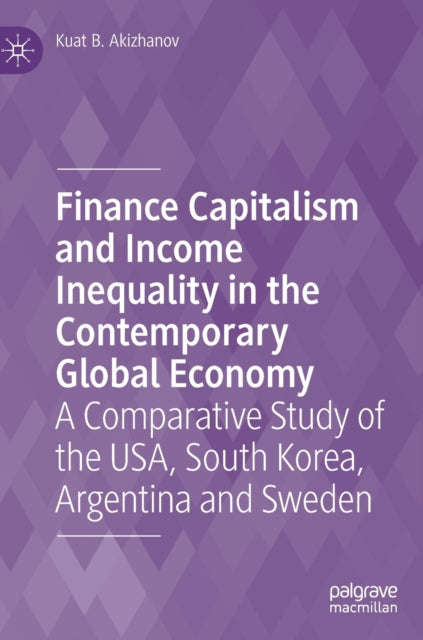Kuat B. Akizhanov
Finance Capitalism and Income Inequality in the Contemporary Global Economy: A Comparative Study of the USA, South Korea, Argentina and Sweden
Finance Capitalism and Income Inequality in the Contemporary Global Economy: A Comparative Study of the USA, South Korea, Argentina and Sweden
YOU SAVE £18.37
- Condition: Brand new
- UK Delivery times: Usually arrives within 2 - 3 working days
- UK Shipping: Fee starts at £2.39. Subject to product weight & dimension
Bulk ordering. Want 15 or more copies? Get a personalised quote and bigger discounts. Learn more about bulk orders.
Couldn't load pickup availability
- More about Finance Capitalism and Income Inequality in the Contemporary Global Economy: A Comparative Study of the USA, South Korea, Argentina and Sweden
This book explores the causes of rising income inequality in industrialized, developing, and emerging economies, tracing the development of finance capitalism over the last 40 years. It presents a comparative analysis of how financialization facilitates uneven capital accumulation and generates conditions that increase income inequality, with case studies from the USA, South Korea, Argentina, and Sweden.
Format: Hardback
Length: 228 pages
Publication date: 16 February 2023
Publisher: Springer International Publishing AG
This comprehensive book delves into the intricate factors contributing to the growing disparities in income levels across industrialized, developing, and emerging economies. By examining the evolution of finance capitalism over the past four decades, the author sheds light on how the neoliberal restructuring of national and global economies has played a pivotal role in exacerbating income inequality. Through a comparative analysis, the book showcases how financialization facilitates uneven capital accumulation and creates conditions that perpetuate income inequality. By outlining an analytical framework for the financialization-induced income inequality nexus, this text serves as a valuable resource for students and researchers interested in the fields of political economy and financial economics.
The rise of finance capitalism has been a significant factor in the increasing income inequality observed in many countries around the world. Over the past few decades, there has been a significant shift in the global economy towards a more financialized system, characterized by the growing importance of financial institutions and markets. This shift has led to a concentration of wealth and power in the hands of a small elite, while many ordinary people have seen their incomes stagnate or decline.
One of the key drivers of financialization has been the expansion of global financial markets. The global financial crisis of 2008-2009 highlighted the risks associated with these markets, but they have continued to grow and become more interconnected. This has allowed investors to move capital across borders with ease, leading to the accumulation of wealth in a few countries.
Another factor contributing to income inequality has been the growth of financialization in developing countries. Many developing countries have seen a surge in financial services, including banks, insurance companies, and investment funds. However, this growth has often been concentrated in urban areas, leaving rural and marginalized communities behind. This has led to a lack of access to financial services for many people, which has hindered their ability to participate in the economy and increase their income.
The impact of financialization on income inequality has been felt across different sectors of the economy. In the United States, for example, the top 1% of earners have seen their income increase by more than 200% since 1979, while the bottom 50% of earners have seen their income decline by approximately 10%. This has led to a growing wealth gap between the rich and the poor, which has significant social and economic consequences.
In addition to the direct impact on income inequality, financialization has also had indirect effects on other aspects of society. For example, it has contributed to the rise of corporate governance, where the interests of shareholders are prioritized over those of employees and the broader community. This has led to increased levels of inequality and has contributed to the decline of worker bargaining power.
There are several ways in which governments and policymakers can address the issue of income inequality caused by financialization. One approach is to increase regulation of financial markets to prevent excessive risk-taking and ensure that financial institutions are operating in the public interest. Another approach is to promote greater financial inclusion, by providing access to financial services for all members of society, regardless of their income or location.
In conclusion, the rise of finance capitalism has been a significant factor in the increasing income inequality observed in many countries around the world. While there are many complex factors contributing to this issue, financialization is a key driver of income inequality. By understanding the mechanisms behind financialization and taking steps.
Weight: 457g
Dimension: 210 x 148 (mm)
ISBN-13: 9783031217678
Edition number: 1st ed. 2023
This item can be found in:
UK and International shipping information
UK and International shipping information
UK Delivery and returns information:
- Delivery within 2 - 3 days when ordering in the UK.
- Shipping fee for UK customers from £2.39. Fully tracked shipping service available.
- Returns policy: Return within 30 days of receipt for full refund.
International deliveries:
Shulph Ink now ships to Australia, Belgium, Canada, France, Germany, Ireland, Italy, India, Luxembourg Saudi Arabia, Singapore, Spain, Netherlands, New Zealand, United Arab Emirates, United States of America.
- Delivery times: within 5 - 10 days for international orders.
- Shipping fee: charges vary for overseas orders. Only tracked services are available for most international orders. Some countries have untracked shipping options.
- Customs charges: If ordering to addresses outside the United Kingdom, you may or may not incur additional customs and duties fees during local delivery.


